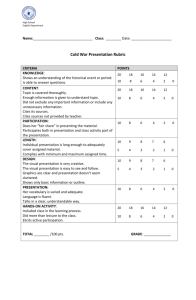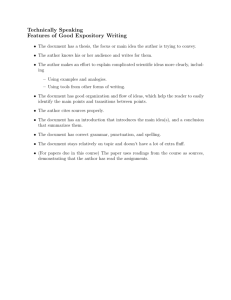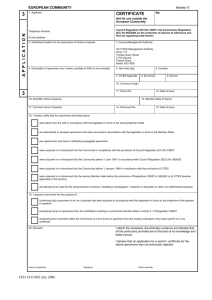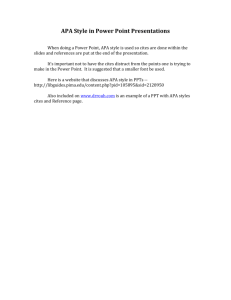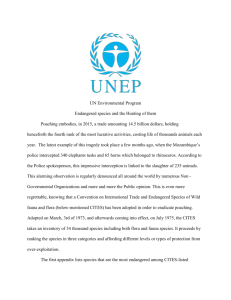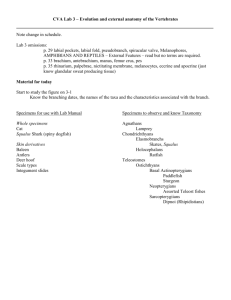No!
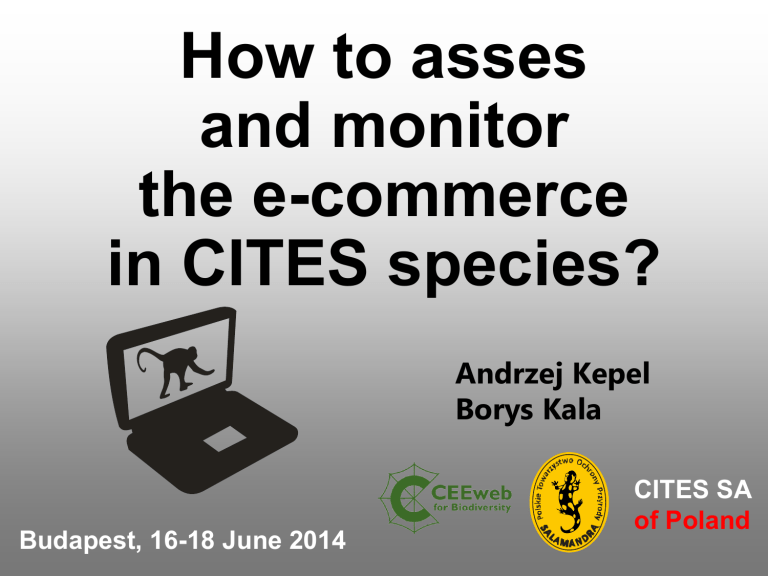
How to asses and monitor the e-commerce in CITES species?
Andrzej Kepel
Borys Kala
CITES SA of Poland
Budapest, 16-18 June 2014
Is it possible to monitor the whole
Internet trade in CITES species?
No!
Is it possible to monitor the whole e-trade in CITES species in one country or a language?
No!
Is it possible to asses the real scale of the whole e-trade in CITES species in one country or a language?
No!
So, why we should make a monitoring of e-trade in CITES species?
What information can be usefull?
To observe trends
To compare (e.g. countries)
To plan and check effectiveness of enforcement efforts
To detect new phenomena
Are these goals achivable?
3 main kinds of surveys of e-trade in CITES species:
Detailed survey of one taxon
Looking for illegal offers
General monitoring
Each one requires different methods
?
@
Survey of a taxon
Search for illegal offers
GENERAL MONITORING
METHOD
- invented by
- developed by
- used in 9 countries
(in CEE Europe and S America)
SCOPE OF MONITORING
• One country or one language
• Animals only, plants only or some smaller but variable group of species
A monitoring consists of:
• Internet surveys (e.g., once a year)
detailed 1-day scan of selected pages
(~20)
full searching for selected species (~6)
• analysis of collected data
SELECTION OF PAGES
FOR SCANING
• biggest services in the country
(including international services)
• different kind of services (auction sites, advertising services, thematic forums, e-shops etc.)
• different groups of species and kinds of specimens
SELECTION OF SPECIES
FOR SURVEYS
(country or language specific)
• representatives of different taxa
• representatives of different categories of specimens
• common, but not too numerous in trade
• limited number of names
• name is not too popular in non-wildlife trade
SELECTION OF SPECIES
FOR SURVEYS
Examples:
• blue coral (souvenirs, jewelry, live)
• emperor scorpion (live, whole dead)
• crocodilians (skin products, souvenirs, live)
• green iguana (live)
• grey parrot (live)
• bears (trophies, hides, parts, medicines, other derivatives, live)
WAYS OF SURVEY
Page scan detailed checking of a service for all CITES/UE WTR species
(checking of categories + keywords)
Searching for species everywhere in Internet, except pages selected for scaning)
(keywords in Google + checking of pages)
TIME RANGE OF A
SURVEY
Offeres no older than
2 months, present on
„one day”
(different services, part of services or species can be checked on different days)
DATA COLLECTED
• Part of survey (page / species)
• Species (higher taxa, appendices, anexes)
• Kind of specimen (category)
• Quantity (with units)
• WWW service (category)
• Price per item (with currency)
• Other (e.g. region, legality)
DATA ANALYSIS
MINIMUM DATA CORRECTION COEFFICIENT
Cxy = (Sxy + Pxy) / Sxy x – country/language y – year
Cxy – minimum data correction coefficient for a country/language and a year
Sxy – number of offers found in searching for species
Pxy – number of offers of selected species found on scanned pages
DATA ANALYSIS
MINIMUM DATA CORRECTION COEFFICIENT
For quantitive analysis and comparisions, data from page scanning are multiplied by coefficient Cxy
DATA ANALYSIS
Coeffcients of minimum data correction in 2011 country BG CZ HU PL RO RS SK UA
Cx 11 1,6 1,4 3,1 1,5 2,2 1,2 1,3 1,1
If coefficient higher than 4
– increase number of surveyed services
DATA ANALYSIS
Assumptions
1. One sale offer
= offer of one or more specimens of the same species and the same type, on a single website
DATA ANALYSIS
Assumptions
2. If information about number of offered specimens is missing:
„several” = 5 specimens
„large/any number” = 30 spec.
[100 in case of arachnids]
- unknown number = 1 specimen
DATA ANALYSIS
Assumptions
3. If the information about the price is missing: avarage price of similar specimens is used for analysis
EXAMPLES OF RESULTS
3500
3060
3000
2650
2500 POLAND
2000
1500
990
1000
500
238
468
0
2004 2006 2007 2009 2011
Estimated average numbers of CITES specimens offers available on one day on the Internet in Poland in the years 2004, 2006, 2007, 2009, 2011
EXAMPLES OF RESULTS
The avarage total value of one day sales offers in CITES animal species in seven countries in
2009
3500
3000
2500
2000
1500
1000
EXAMPLES OF RESULTS
500
0
BG CZ HU PL RO RS SK UA
2009 2011
Estimated average number of CITES specimens' offers available on one day on the websites of monitored countries in 2009 and 2011
25
30
EXAMPLES OF RESULTS
26,6
20
16,3
13,7
15
10
8,6
8,2 8
5
4,1
5,5
5,9
5
3,1
1,3
4,6
0,5
0
BG CZ HU PL RO RS SK UA
2009 2011
Estimated average number of CITES specimens offered for sale available on the Internet in the monitored countries on one day per 100 thousand citizens in 2009 and 2011
EXAMPLES OF RESULTS
50
45
40
35
30
25
20
15
10
5
0
13,6
28,6
5,2
12,4
6,7
15,3
45,5
4
12,9
9,9
9
22
2,4
25,3
BG CZ HU PL RO RS SK UA
2009 2011
Estimated average number of CITES specimens offered for sale, available on the Internet in the monitored countries on one day, per 100 thousand Internet users in 2009 and 2011
EXAMPLES OF RESULTS
18%
34%
4%
3%
1%
40% reptiles birds athropods corals & see anemones mammals amphibians
Percentage share of different systematic groups of species, which were offered for sale on the
Internet in the monitored countries in 2011
EXAMPLES OF RESULTS
Estimated share of nine leading services in the
Internet trade on CITES animal species in Ecuador
EXAMPLES OF RESULTS
18%
58%
24% most likely legal most likely illegal dubious legality
Division of the monitored sales offers in terms of legality
HOW MUCH WORK IT
REQUIRES?
1 survey: ~10-20 man-days
+ ~5 man-days for data analysis
WORKSHOP
(TRAINING)
FOR
INTERESTED
ENFORCEMENT
INSTITUTIONS
FROM CEE
COUNTRIES
IN 2015
